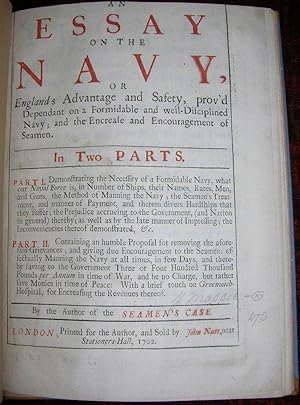Descripción
DENNIS, John (1657-1734). An essay on the navy, or England s advantage and safety, prov d dependant on a formidable and well-disciplined navy; and the encrease and encouragement of seamen. In two parts. Part I. Demonstrating the necessity of a formidable navy, what our naval force is, in number o ships, their names, rates, men, and guns, the method of manning the navy; the seamen s treatment, and manner of payment, and therein divers hardships that they suffer; the prejudice accrueing to the government, (and nation in general) thereby; as well as by the late manner of impressing; the inconveniences thereof demonstrated, &c. Part II. Containing an humble proposal for removing the aforesaid grievances; and giving due encouragement to the seamen: effectually manning the navy at all times, in few days, and thereby saving to the government three or four hundred thousand pounds per annum in time of war, and be no charge, but rather save monies in time of peace: with a brief touch on Greenwich hospital, for encreasing the revenues thereof. By the author of the Seamen s case. London: John Nutt, 1702. Small 4to., (8 x 6 inches). Title-page printed in red and black, large folding letterpress table: "A List of the Royal Navy, describing their Names, Rates, and Number of Men and Guns they carry" and "A Table of the Officers Titles, their Number and Wages in each Rate, according to the present Establishment, by the Book of Rates". Modern half tan calf. Provenance: with near contemporary marginal annotations to page 19. During the first decade of the eighteenth century, Dennis was England's leading critic, "an elegant prose stylist possessed of a shrewd and perceptive literary intelligence" (Jonathan Pritchard for DNB). Dennis argues that it makes economic and political sense to build up a formidable navy during peacetime. He is also concerned with the practical welfare of the sailors, pointing out the poor conditions, the inadequate system of payment and the injustice inherent in the practice of impressing. Although Dennis had taken the cause of Royal Navy ratings before parliament in his "The Seamens Case", ca 1699, and had published another pamphlet on naval affairs, "A Proposal for Putting a Speedy End to the War", 1703, in which he reveals an impressive command of detail and sympathy for the sailor's plight, he was twice accused of defrauding seamen of their wages. "That a Naval Force is necessary, we may learn from the situation of these Kingdoms, which Providence hath so dispos'd, that without the benefit of Navigation, we should not only lose the unspeakable Advantage that accrues by the Exportation of our Woollen Manusactures, and other Merchandizes of the growth and produce of these Kingdoms, but also be utterly depriv'd of all Correspondence and Communication with our neighbour Nations, and also with our numerous Colonies and Plantations abroad, whose sole dependence for protection and supply, is on these Kingdoms; the which if interrupted by Foreign Force, would not only reduce them to Hardships and Necessity, but also expose them, as well as these Lands, to the Insults of every Enemy, and cause them to become a Prey, and to submit to the Yoak of every proud Invader" (page 2). The letterpress table is very interesting, and lists all the ships in the Navy in 1702, including 7 First Rate ships: St. Andrew, Britannia, London, Soveraign, Queen, Victory, and Royal William, with a total of 702 guns between them and 5228 men. British Naval operations in the War of the Spanish Succession (1702 1713) were allied with the Dutch against the Spanish and French. At first the conflict was based in the Mediterranean, culminating in an alliance with Portugal and the capture of Gibraltar (1704) and Port Mahon in Minorca (1708). In addition Newfoundland and Nova Scotia became part of the empire. Successes against the Spanish did follow, and allowed for the realms of the Spanish Empire to become available to the British Slave Trade. Spanish o. N° de ref. del artículo 72lib1235
Contactar al vendedor
Denunciar este artículo
![]()

